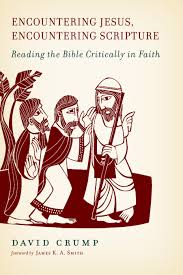 David Crump.
Encountering Jesus, Encountering Scripture: Reading the Bible Critically in Faith.
David Crump.
Encountering Jesus, Encountering Scripture: Reading the Bible Critically in Faith.
Grand Rapids: Eerdmans Publishing, 2013. Pp. x + 145. ISBN: 978-0-8028-6466-6. $20.00 [Paperback].
The Epistle to the Hebrews presents a multi-layered christocentric form of divine revelation. Finding some parallel to the Johannine Logos, Heb 1:1–4 presents the speaking acts of God manifested in a person, the Son of God. That is, God speaks simultaneously through the prophets of old and through his Son. This Word—Jesus, that is—must be kept and heeded carefully (Heb 2:1). It is this “W/word” that created the universe (Heb 11:3; cf. Gen 1:3). With Hebrews presenting a Word-Christology, or a divine christocentric revelation, what must the interpreter do with Heb 4:12–13? The “Word” is living and active. So then, when we hear from God, we are confronted with the presence of Jesus and vice-versa. When we encounter Jesus, we are confronted with the words of God.
David Crump provides the participants of Christian scholarship a valuable resource. At some point, for Christian scholars, they are presented with a dilemma—how must I relate my experiences and subjective relationship with God to the “proven”, “scientific”, “objective” standards of scholarship. According to Crump, it is not an either/or dilemma, but a both/and.[1] Higher education, then, is not a curse intended to bring existential crises to students. Rather, as Crump says,
My goal in this book is to secure thorough integration of heart, mind, and soul by keeping first things first. In the realm of Christian understanding, the most fundamental questions do not concern historical evidence, archaeological data, literary genre, or any of the sundry matters usually tied to the rational explanation of empirical evidence. Rather, the basic issues in this arena epistemological and spiritual: How can a person come to know God?[2]
Throughout the text, Crump seeks to affirm that encountering Jesus in a meaningful relationship is not bound up in making historical judgments or produced by literary readings. Rather, it is about encountering God in the words of Scripture, even for the critical scholar. James Smith correlates this work along the lines of other recent works discussing theological interpretation of Scripture, such as Richard Hays, Joel Green, Kevin Vanhoozer, Todd Billings, and others.[3]
Crump does provide a more positive reading of Kirkegaard and Rudolf Bultmann.[4] These figures are used as representatives of two scholars, embedded in historical scholarship, but still sought to encounter a meaningful relationship with God and Jesus.
Personally, and at a keenly appropriate time, the last chapter is worth the price of the book. Here, he identifies the disjunction of scholarship and personal care to ones relationship with God. Reason and faith are not at odds with one another, whereby faith champions anti-intellectualism.[5] According to Crump’s reading of Kierkegaard, “reason’s sinfulness clearly reveals itself in the continual proliferation of a particular brand of scholarship—biblical or theological research that accumulates information while never challenging or transforming the learner.”[6] Moreover, Crump suggest that the intended labor of the interpreter is actually an attempt to defend oneself against it—“like a naughty school boy who, knowing that he will soon get a spanking, stuffs napkins down the seat of his pants.”[7] According to Kierkegaard, “this is the most cunning way to remove God’s word as far as possible from me.”[8]
Crump gives a healthy warning and corrective to aspiring Christian scholars. How is theological productivity measured? He asserts the following.
If we measure theological productivity in terms of truthful understanding of Scripture and the things of God, then a chastened reason has the upper hand. If academic productive, even in theological circles, is measured by creative theorizing under the tutelage of academic advisors, acquisition of advanced degrees, promotion and tenure, growing book sales, professional recognition, and remaining an acceptable member of the mainstream, then a disciplined reason may or may not be a measurable improvement.[9]
This helpful, and rather honest, assertion compels scholars and academic thinkers to be vibrantly assertive in making ones soul, mind, and ethic correspond to the reality of God and ones experience of God when reading the Scriptures.
This text raises important questions for the academic scholar regarding the relationship between Christian scholarship and faith in Jesus. As Smith says, “this book is liable to fall between the cracks of our disciplinary silos and into the enduring gap between the academy and the church. And yet this very liability is why this book is so needed.”[10] I agree! Although I do not adhere to the majority of Kierkegaard’s and Bultmann’s teachings, it was helpful to see their honest plight of finding spirituality in their, regrettably, dry and dim field. This is a helpful read and I trust other scholars will pick this up, especially those experiencing the personal and inward turmoil of faith and scholarship. As one of my mentors have told me, “choose lordship over scholarship.” Rather, scholars ought to choose lordship within scholarship so that they encounter Jesus in the Scriptures and their intellectual enterprise is transformed and enraptured with the beauty of God in His Word.
[1] David Crump, Encountering Jesus, Encountering Scripture: Reading the Bible Critically in Faith (Grand Rapids: Eerdmans Publishing, 2013), 114–15.
[2] Crump, Encountering Jesus, Encountering Scripture, 5.
[3] James K.A. Smith, “Forward,” in Encountering Jesus, Encountering Scripture: Reading the Bible Critically in Faith, by David Crump (Grand Rapids: Eerdmans Publishing, 2013), viii.
[4] Crump, also, is keenly aware of major critiques leveled against Kiekegaard and Bultmann, such as historical-critical methods, anti-supernaturalism, demythology, highly subjective use of form criticism, and more. Crump, Encountering Jesus, Encountering Scripture, 7, 11n17.
[5] Crump, Encountering Jesus, Encountering Scripture, 119.
[6] Crump, Encountering Jesus, Encountering Scripture, 121.
[7] Crump, Encountering Jesus, Encountering Scripture, 121.
[8] Quoted in Crump, Encountering Jesus, Encountering Scripture, 121.
[9] Crump, Encountering Jesus, Encountering Scripture, 132–33.
[10] Smith, “Forward,” viiin2.
